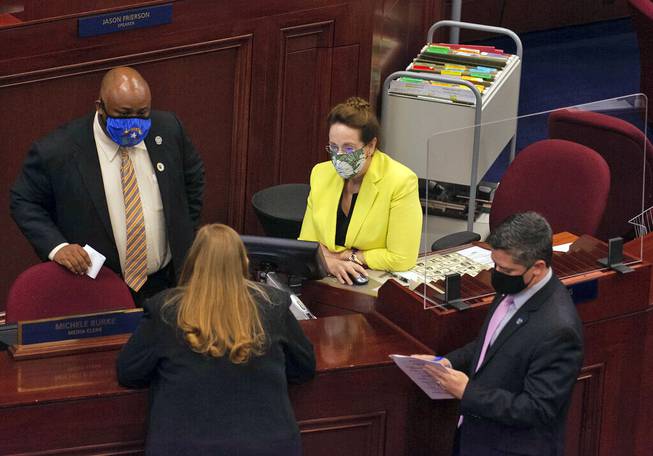
David Calvert / The Nevada Independent via AP
Assembly Speaker Jason Frierson, Assemblywoman Maggie Carlton, Chief Clerk Susan Furlong and Assemblyman Steve Yeager gather during a special session of the Nevada Legislature in Carson City, Nev., Wednesday, July 15, 2020.
Wednesday, July 15, 2020 | 11:45 p.m.
CARSON CITY — In 1989, a special session of the Nevada Legislature was called to repeal legislation passed earlier in the year that drastically increased lawmakers’ retirement benefits.
The legislation was repealed in two hours, record time for a special session in the Silver State.
In 2003, a special session to iron out a tax plan turned into a 27-day marathon, the longest special session in state history.
The current special session, called to address a $1.2 billion deficit in the state budget caused by the coronavirus crisis, is entering its eighth day. And this session, unlike the others, has one unique challenge: The first session with social distancing requirements, coronavirus testing and more to limit the virus spread.
“We are here in order to address (important issues), and as long as conditions allow for us to do so safely I think we’ve been … responsible with updating our rules to allow for it, and we’ll continue to do that,” Assembly Speaker Jason Frierson, D-Las Vegas, said.
The initial two bills of the session weren’t passed until Tuesday. Some days feature little movement. That’s to be expected, according to one local expert.
“In recent years we have gotten used to special sessions being short,” wrote Michael Bowers, a political science professor at UNLV, in an email to the Sun. “However, historically special sessions have varied widely in terms of their length such that it is impossible to say that there is a ‘typical’ length of time for a special session.”
The severity of the proposed cuts to state agencies and services in reaction to the crisis makes the process more difficult, Bowers said. That’s especially true since the crisis was sudden.
“In terms of the severity of the proposed cuts to the budget, this special session is not unique,” Bowers said. “That doesn’t mean it’s not painful or harmful to Nevadans in the short and long terms, but it has happened before and it will likely happen again.”
After a slow start to the session, lawmakers started to pick up the pace on Wednesday.
The Assembly brought forward Assembly Bill 3, which details cuts to state agencies and departments to fill the budget deficit, including nearly $156 million from K-12 education and $233 million from the $1.5 billion allotment from the Department of Health and Human Services. And late Wednesday night, Assembly lawmakers passed a measure that would accelerate the collection of mining taxes after it was passed in the Senate. That would bring would bring in $54 million to the state’s general fund earlier than expected.
Lawmakers haven’t given a solid indication as to when the session would wind down, although there are some spirited talks on the horizon.
Legislative leaders have consistently referred to “ongoing discussions” about revenue and the budget that need to be ironed out before final cuts are passed. The Legislature is constitutionally required to balance the budget, as the state cannot operate at a deficit, so the budget-cut bill is the center of the session.
Democratic legislative leadership has expressed the challenge of balancing the budget while simultaneously avoiding putting the burden on lower-income Nevadans. Frierson has said this is a large consideration in trying to come up with revenue sources, and has said that a sales tax was something he’d consider putting the burden on working Nevadans.
“These proposals before lawmakers are not ones that my office or state agencies proposed lightly,” Gov. Steve Sisolak said last week. “Our state agency directors have had to make painful reductions in their own departments, and while necessary, the reductions are difficult to see.”
Once it’s agreed on, the session will essentially be done. At least that session.
There’s still also the matter of a second special session, which will likely be called after the end of the current session. That session is expected to include social reform measures that include changes to law enforcement and the electoral process. Specifics have not been released.
Frierson said lawmakers have the obligation to address “the needs of the community,” which he said include social justice issues.
